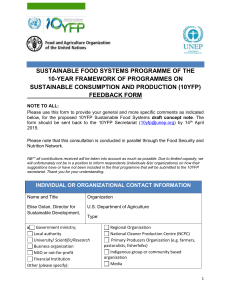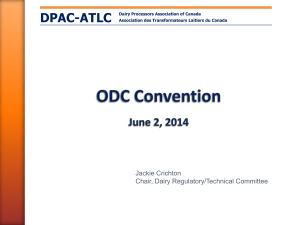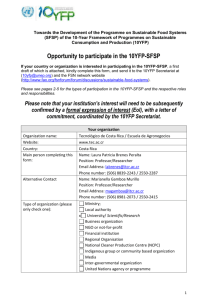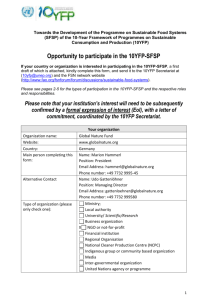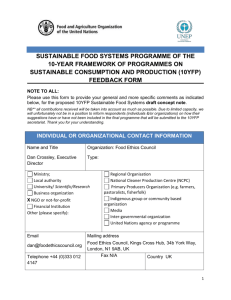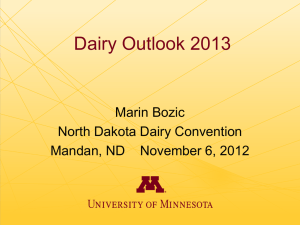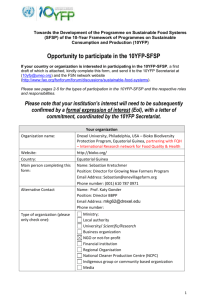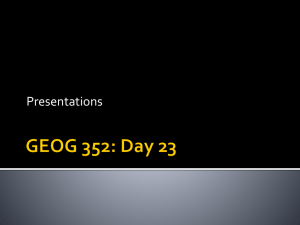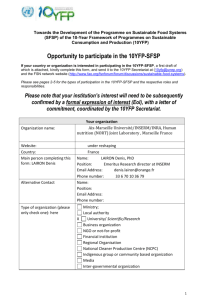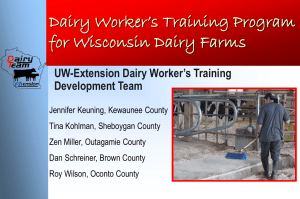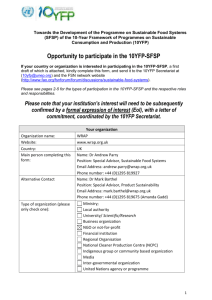Participation_in_SFS_programme_EN_IDF
advertisement
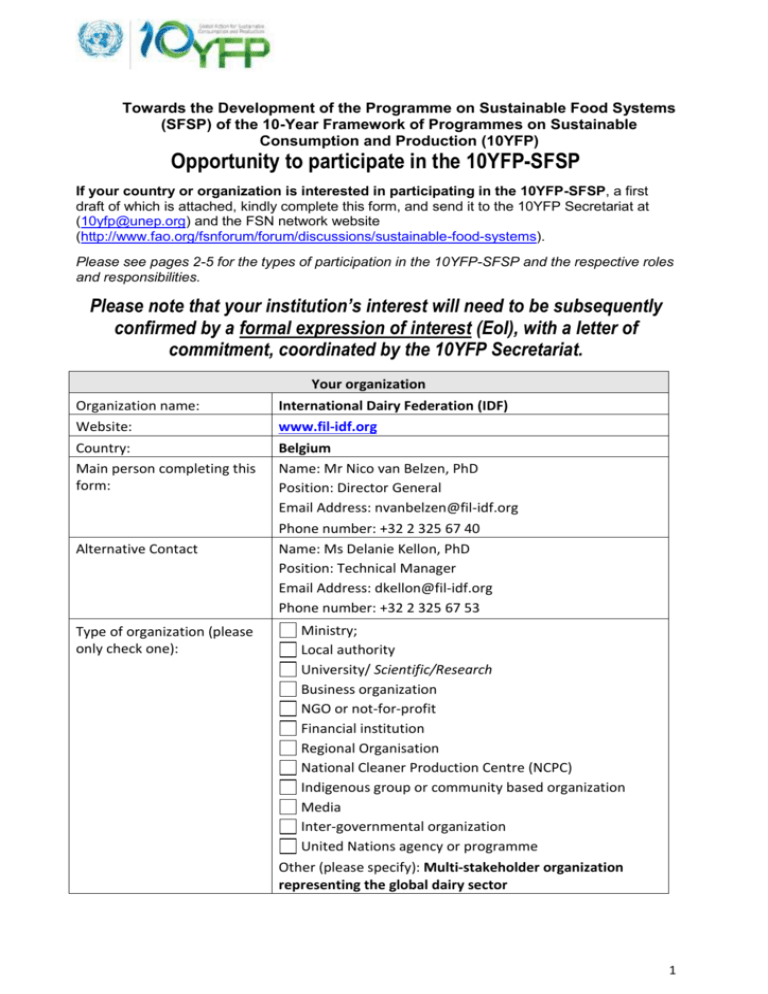
Towards the Development of the Programme on Sustainable Food Systems (SFSP) of the 10-Year Framework of Programmes on Sustainable Consumption and Production (10YFP) Opportunity to participate in the 10YFP-SFSP If your country or organization is interested in participating in the 10YFP-SFSP, a first draft of which is attached, kindly complete this form, and send it to the 10YFP Secretariat at (10yfp@unep.org) and the FSN network website (http://www.fao.org/fsnforum/forum/discussions/sustainable-food-systems). Please see pages 2-5 for the types of participation in the 10YFP-SFSP and the respective roles and responsibilities. Please note that your institution’s interest will need to be subsequently confirmed by a formal expression of interest (EoI), with a letter of commitment, coordinated by the 10YFP Secretariat. Your organization Organization name: International Dairy Federation (IDF) Website: www.fil-idf.org Country: Main person completing this form: Belgium Name: Mr Nico van Belzen, PhD Position: Director General Email Address: nvanbelzen@fil-idf.org Phone number: +32 2 325 67 40 Name: Ms Delanie Kellon, PhD Position: Technical Manager Email Address: dkellon@fil-idf.org Phone number: +32 2 325 67 53 Alternative Contact Type of organization (please only check one): Ministry; Local authority University/ Scientific/Research Business organization NGO or not-for-profit Financial institution Regional Organisation National Cleaner Production Centre (NCPC) Indigenous group or community based organization Media Inter-governmental organization United Nations agency or programme Other (please specify): Multi-stakeholder organization representing the global dairy sector 1 Brief description of your organization (please include objective and main areas of interest) The International Dairy Federation (IDF) represents the global dairy sector and ensures the best scientific expertise is used to support high quality milk and nutritious, safe and sustainable dairy products. We aim to help nourish the world with safe and sustainable dairy. We are committed to furthering current knowledge on a wide range of issues, including environment and sustainable development, health and nutrition, methods of analysis, farm management, animal health and welfare, dairy science and technology, food hygiene and safety, food standards, dairy policies and economics, and marketing. Please specify your proposed participation in the 10YFP-SFSP Type of proposed Lead actor participation Co-Lead actor Member of Multi-stakeholder Advisory Committee (MAC) Coordinator of a programme work area Partner What is your main motivation IDF pro-actively supports a vibrant dairy sector committed to be part of the 10YFP-SFSP? to continuously improve its ability to provide safe and nutritious milk and dairy products from healthy animals to Please explain in a few close the nutritional gap whilst preserving natural resources paragraphs and ensuring decent livelihoods across the whole dairy value chain by: • Developing and promoting sustainable practices across the dairy supply chain; • Providing science-based guidance and leadership on dairy sustainability issues to key international organizations and influencers; and • Promoting that sustainability includes environmental, economic, social and nutritional components. IDF also supports science-based nutrition policies to ensure that dairy is an integral part of the diet for all age groups, by: • Assembling science-based evidence for the critical role of dairy in nutrition; • Proactively engaging with nutrition policy makers and key influencers; and • Creating awareness among key intergovernmental organizations and influencers of science-based evidence that supports the essential role of milk and 2 dairy products as part of healthy and sustainable eating patterns. Given IDF’s efforts to improve the sustainability of dairy, IDF is well-positioned to contribute to the work proposed by the 10YFP-SFSP in the following areas: “The SFSP will contribute to the 10YFP vision, objectives and goals by supporting regional and national initiatives in order to accelerate the shift towards sustainable food consumption and production systems for achieving global sustainable development, while improving efficiency and sustainability in the use of resources and reducing resource degradation, pollution and waste.” Work Area 1 includes: “…the development of global partnerships to compile open-source inventory of life-cycle data. Together these could encourage the development of a common protocol for data collection to support design of sustainable food chains/systems, explore and develop the business case for the shift towards SCP in the sector and fulfill the demand for data on carbon, water, nitrogen, footprints etc. for eco-labelling and ecocertification of food products and food systems.” The expected outcome is to: “…propose a mix of policy, regulatory and voluntary instruments and sustainability indicators, to be implemented on a voluntary basis to accelerate the uptake of SCP practice across food systems.” How could your country or organization contribute to the development and implementation of the 10YFP-SFSP? Through its worldwide network of experts, IDF provides a forum for evaluating and reaching consensus for the global dairy sector. This results in a consistent understanding and application of science with respect to the many, complex and interconnected areas that support sustainable dairy systems, as one important aspect of an overall sustainable food system. By participating as a Partner in the 10YFP-SFSP, IDF would be able to contribute valuable technical and scientific input that has already been validated and agreed upon by the global dairy sector (and in some cases, also by the livestock sector broadly, as in the case of guidance developed by the LEAP Project). Please provide a brief description of your efforts in the field of sustainable food systems. 3 A few examples of IDF’s multi-stakeholder collaborations in the area of sustainable dairy and sustainable livestock systems: IDF is a signatory of The Global Dairy Agenda for Action (GDAA), which has developed the Dairy Sustainability Framework (DSF), through which the global dairy sector is collaborating to improve the sustainability of the entire dairy value chain through a holistic approach to sustainability (environment, social and economic aspects) www.dairysustainabilityframework.org Specifically with respect to the environment, IDF’s global network of scientific experts are working on a range of environmental topics focused on improving the sustainability of the full dairy chain, such as water footprinting, carbon footprinting, biodiversity assessment, innovative practices for eco-friendly dairy processing, among others (e.g. http://www.idf-lcaguide.org/Public/en/LCA+Guide/Introduction). IDF also collaborates with other livestock sectors by serving on the Steering Committee of the FAO Livestock Environmental Assessment and Performance (LEAP) Partnership (http://www.fao.org/partnerships/leap/en/), and the Guiding Group of the Global Agenda for Sustainable Livestock (GASL) (http://www.livestockdialogue.org/). IDF has collaborated with and represented the global livestock sector in the Second International Conference on Nutrition, ICN2 (http://www.fao.org/about/meetings/icn2/nsa/private-sector/en/). As the representative of my organization/government, I confirm that the information is correct and true. Date 12 April, 2015 Name Nico van Belzen Before expressing any interest, please, kindly read carefully the “Guidance document on the 10YFP PROGRAMMES : Criteria, structure and steps to develop and operationalize them”1, which explains the objective and activities of the programme, the different roles available and benefits and responsibilities associated with them. Immediately below you will find a summary of the role and responsibilities of the Lead and Co-leads, Multi-stakeholder Advisory Committee (MAC) members, and Partners of the programme. These will be set out in more detail in the formal Expression of Interest form that you will receive subsequently from the 10YFP Secretariat. ____________________________________________________________________ Role and Responsibilities of the Lead and Co-leads of a 10YFP Programme: Support the overall coordination of the programme implementation and proactively fundraise for the programme; Provide financial and/or in-kind contribution, including dedicated staff in support 1 Document available at: www.unep.org/10yfp and http://www.unep.org/10yfp/Portals/50150/Guidance_Doc_10YFP_Programme%20development_1_V1_March14.pdf 4 of a “Coordination Desk” (each programme will need a minimum of 1-2 full time staff to start operating); Jointly supervise the work of the Coordination Desk (whose tasks could be executed from different geographical locations); Chair and co-chair the MAC meetings, facilitate the decision-making within the Committee and support its activities, including those related to securing support from the 10YFP Trust Fund; Act as liaison and focal point for contacts between the Secretariat and the SFS programme and all its partners; Report on progress and outcomes as required, including through the preparation of an annual report for the 10YFP Secretariat to convey to the Board and to be included in the 10YFP report to ECOSOC. Criteria for lead and co-leads: Any government from any UN member state relevant regional or national organizations, international organizations (including UN agencies), industry or business organizations, non-governmental/civil society organizations or academic institutions, or any other entity that supports the goals of the 10YFP (www.unep.org/10yfp) and agrees to work towards them can apply to become a lead or a co-lead of a specific 10YFP programme. The lead and co-lead(s) should: • demonstrate an active or leading role in supporting the shift towards sustainable consumption and production patterns at national and/or regional levels; • provide resources (including in-kind contributions or expertise) for coordination and implementation of activities under this programme; and • ensure minimum commitment to remain engaged for at least four years. Role and Responsibilities of the MAC of a 10YFP Programme: review goals, objectives and measures of success, based on the initial programme’s work plan, with the aim of providing guidance on progress towards more sustainable consumption and production patterns; review on the performance and evolution of the programme’s work plan, advise on and proactively engage new partners, initiatives and activities in the line with the objectives of the programme, as well as in response to emerging demand and priorities; enhance synergies and cooperation among stakeholders within the programme as well as with other programmes of the 10YFP; propose projects and/or activities for implementation in accordance with the work plan of the programme; provide guidance to the 10YFP Secretariat for the elaboration of calls for proposals 5 for the 10YFP Trust Fund, in the area of the programme, and to screen and short list proposals received based on established criteria; Criteria for the members of the Multi-stakeholder Advisory Committee Any government from any UN member state relevant regional or international organizations, industry or business organizations, non-governmental/civil society organizations or academic institutions, or any other entity that supports the goals of the 10YFP and agrees to work towards them can apply to become a member of the MAC of a specific programme. The composition of the MAC ideally could reflect a diversity of partner categories and geographic regions, in this context, members of the MAC should: demonstrate strong interest and/or recognized expertise and experience, if possible reflected in policies and actions, in the area of the programme; have played an active or leading role in supporting the sustainable consumption and production and/or sustainable development agenda at the national and/or regional levels. Role of Coordinators of the Programme Work Areas Coordinators of a programme work area are not necessarily members of the MultiStakeholder Advisory Committee, but can take an active role in coordinating one or more of the programme work areas. When coordinating a work area of the programme, they are responsible for ensuring that the related activities are delivered in an inclusive and effective manner. They bring their expertise, expand their networks and partnerships, build synergies and help scale-up and replicate best practices on SCP at all levels. ____________________________________________________________________ Role of Partners Any stakeholder supporting implementation and/or benefiting from the activities of the programme could be a partner of a programme. Those activities include workshops, trainings, making use and supporting dissemination of the materials, including policy and capacity-building tools and reports produced by the programme. Partners do not necessarily need to provide technical and/or financial support. Thank you very much for your time., 6
